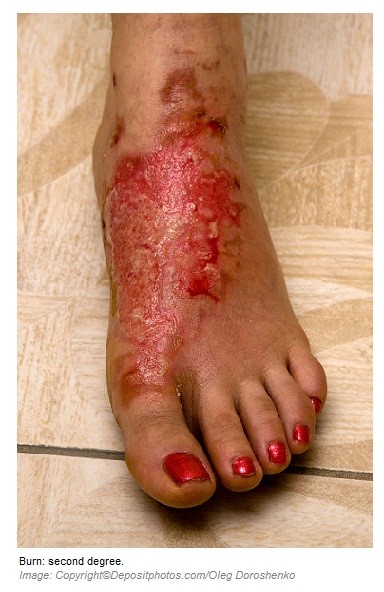Burns are damages or injuries of the skin or other tissues caused by exposure to extreme
 heat, steam, scalding liquids, chemicals, electricity, or radioactive materials.
heat, steam, scalding liquids, chemicals, electricity, or radioactive materials.
Burns are classified based on the depth of burn injuries and percentage of total body surface area (TBSA) involved. The depth of a burn is mainly affected by the length of time exposed to the causative agent and the temperature of the heating agent.
First-degree burns: the skin is red, dry and painful.
Second-degree burns: the skin is red, moist, painful and blistered.
Third-degree burns: injury has extended into the tissues beneath the skin and may involve muscle and bone.
Nutritional Supports:
Restricted Foods:
- Saturated fats.
- Trans-fats.
- Processed foods.
- Fried foods.
- Sugars and sweets. They interfere with healing process and weaken immune system.
- Foods high in linoleic acid (a type of Omega-6): safflower, sunflower, sesame, and grape seed oils. Linoleic acid is a pro-inflammatory.
- Alcohol and coffee. They may cause dehydration which is not desirable in burns.
- Additives, preservatives, and food colorings. They may interrupt the healing process.
Recommended Foods:
- Plenty of water: at least 2 liters a day. Dehydration is dangerous in burns.
- Whole grains.
- Legumes.
- Cold water fish: salmon, herring, and mackerel.
- Flaxseeds.
- Chia seeds.
- Hemp seeds.
- Fresh fruits and vegetables.
- Fruits high in flavonoids: berries, and red grapes.
- Fruits and vegetables high in beta-carotene: green leafy and orange-colored vegetables.
- Ginger.
- Spices high in antioxidants: sumac, turmeric, and cinnamon.
- Chamomile and peppermint teas.
Recommended Supplements:
- Aloe Vera Juice: ¼ to ½ cup three times a day. It has internal and external healing effects and speeds up the healing by providing different nutrients.
- Zinc: 50 -100 mg a day.
- Vitamin C: 2 – 3 grams a day.
- Vitamin E: 400 – 800 IU a day.
- Vitamin D (for extensive burns): 2000 – 5000 IU a day.
- Glutamine: 3 – 5 grams a day. This amino acid is required for tissue healing and supports the immune system against infection.
- OKG (Ornithine Alpha-Ketoglutarate): 5 – 10 grams a day. This is not considered as an amino acid and consists of ornithine bound to two molecules of alpha-ketoglutarate. OKG has an anti-catabolic effect, supports healing, and boosts the immune system.
- Whey Isolate Protein Powder: 1 – 2 scoops a day.
- Multivitamins – Multiminerals: A high potency product.
Topical Implications:
- Colloidal silver ointment or gel: apply topically over the area two to three times a day. It prevents from secondary skin injections.
- Calendula cream: apply two to three times a day onto the affected areas. Calendula contains flavonoids, saponins, and carotenoids that reduce inflammation and itching, and improves healing.
- Aloe Vera gel: apply two to three times a day onto the skin lesions. It has a healing effect.
Miscellaneous Suggestions:
- Apply ice on the area. It reduces pain and swelling.
- Cold compress
- Apply egg whites immediately on the area. Egg white contains natural collagen and it helps with healing.
- Honey: apply to the area. It helps with healing and prevents from skin infection.
- Apple cider vinegar: apply on the area. It reduces pain and burning sensation.
- Plantain leaves: apply topically. It contains mucilage that helps with healing.

